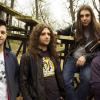Q&A With Billy Bob Thornton and J.D. Andrew of The Boxmasters

Billy Bob Thornton is best known for his work in film, but he has a long musical history, too. His band The Boxmasters is currently touring behind a couple of new records, including Providence, recently released via the group's website. Flagpole caught up with Thornton and his bandmate J.D. Andrew in advance of Tuesday's show at the Georgia Theatre.
Flagpole: Billy, you go way back with Athens. Your directorial debut was a live Widespread Panic show at the Georgia Theatre. What are your impressions of Athens, and what are your feelings about coming back to town?
Billy Bob Thornton: Well, it’s pretty good. Like you said, I was down there directing their first long-form video, and then we did a short video. At the time, I was managed by Phil Walden, who was at Capricorn Records for all those years. So, Phil hooked me up with Widespread. I knew Col. Bruce Hampton, who opened the show at the Georgia Theatre that we shot. We did a video on Bruce which I don’t think ever came out, but we did it for fun. I knew Vic Chesnutt very well. I wound up putting Vic and Bruce in Sling Blade. So, I have a lot of ties to Athens. I see the guys from Widespread pretty often. I just saw Jojo in Nashville on the last tour.
Athens is a very familiar place to me, and I will never forget interviewing the guys backstage with Bruce and the weirdness that ensued. We look forward to coming there. Athens is such a real music town and a real cool place. It’s a town where people get around and say hello to each other. It’s just a terrific place.
FP: J.D., you have a storied past in terms of audio engineering. How did you wind up in The Boxmasters with Billy Bob?
J.D. Andrew: I started out half-assed, chasing the singer-songwriter thing. I went to Nashville and played at the Bluebird one time and went, “Ya know, this isn’t really for me.” I went to recording school in Orlando and just thought I’d concentrate on the recording thing. That was 20 years ago.
A friend of mine told me that if I really wanted to become an engineer, I really needed to move to L.A. My friend’s wife gave me my first job at a studio. In 2006, she called me because she was managing Billy Bob’s music career. She called me and asked me, “Hey, do you want to record some vocals?” Well, of course I do. For one, you never turn down a gig and, second, I didn’t know about his music, but I was always a fan.
So, I listened to some songs which were on his record Beautiful Door, and I was really blown away. We dove into work… Then one day, he came into the studio and he said, “I need to record a song for a Canadian TV show. How well do you play guitar?” We just started recording songs, and we just haven’t stopped.
FP: Do you feel less pressure because you have someone with such a high profile in your band?
JDA: It’s not easy. The Boxmasters have been doing this almost nine years. Billy’s been putting out solo records since 2000. Every day, it’s still, “I didn’t know he was in a band!” It’s hard getting people to learn that this is a really good band, and that the songs are good and that we go out and we play one heck of a show. We do have a core group of fans, and they do help us out with spreading the word, but it’s still not easy. We’re not Internet wizards. We don’t know how to get everyone fired up.
People used to come see you without the cynicism and without their arms folded.
FP: The Boxmasters really have a great deal of lyrical wit and dark humor, which is not very consistent with contemporary country or roots-based music. Where did that come from?
JDA: Our early records had a lot of humor—and extremely dark humor—involved in them. There’s not as much on this last record, Somewhere Down the Road. Sometimes in the world we’re in, as much as people need it, they don’t understand when something is funny or tongue-in-cheek. It’s a character a lot of the time, and not necessarily Billy. The state of music right now, it’s funny. There are a lot of songs about partying, but not a lot that include a lot of humor. These aren’t songs that are immediately accessible to everyone all of the time, which I love. I’m a fan of deep singer-songwriters, rather than “sit-on-a-tailgate-and-drink-my-beer” sorts of songs.
BBT: I mean, the first couple of Boxmasters records are experimental and stylized. There’s a lot of tongue-in-cheek humor involved. The [album] that’s out now, it only has a couple of humorous songs on it. I think the most common misconception about the band is that we’re a country band, which we’re not. We’re more influenced by Big Star and the British Invasion. And then we do some darker music that is inspired by John Prine and Johnny Cash and people like that.
A lot of times, everyone who isn’t pop or hip hop or country, you’re on the Americana charts. So, we’re on there with Emmylou Harris, Steve Earle and Phish. But I think on the first couple of Boxmasters [albums], we [had a] really stylized sound: “What if the British Invasion met hillbilly music and we’ll sing it like David Allen Coe?” And a lot of that comes from me growing up listening to the Mothers of Invention. Later on, Zappa had a series of live recordings called Does Humor Belong in Music? It was his feeling that if you put humor into a song with a political topic, maybe it’s more palatable to people.
FP: Musicians can manage more private lives than movie stars, it seems. Does it feel relieving at all to go out and tour instead of having to promote a film?
BBT: I’ve always considered it to be the same thing. Whatever an artist does, it’s coming out of the same mind… Making music is a lot more immediate. You make a movie and a year later, it comes out, and you’re not there when the people see it. Whereas when you tour behind [a record], people are right there. You get to see them face to face. In that sense, it’s different.
It’s funny, if I went out on a film lecture tour and we did theatres with 1,500 capacity, it would sell out in about four minutes. When I go out with the band, we’re lucky to be half-full at a venue. What people need to know is that we do both. We don’t just play songs; I go out there and I communicate with the audience.
FP: Has the art of music been cheapened over the past few decades, at least in terms of how the public consumes it?
BBT: Yes, absolutely; there’s no doubt about it. There was a time when there was a mystique. We’d go to concerts, and the only time you saw those people was there. And the only time you heard them was when they made a record. And the only way to get that record was to go down to the record store and buy it. The fact that there’s so much access to everything now has absolutely taken the magic away.
I imagine in a town like Athens, it’s not the case as much as elsewhere. But, it definitely has been cheapened. When I was playing in bands as a teenager and in my early 20s, we would open for everybody. We played regionally in the South, and they would get local acts to open for the big names. So, we played coliseums opening for Black Oak Arkansas, ZZ Top or Ted Nugent. But we got the thrill. Back then, the mystique was real. People used to come see you without the cynicism and without their arms folded.











comments